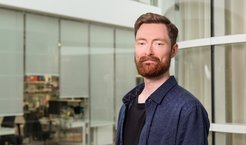New research group led by Hans-Georg Sprenger
Why does exercise slow down ageing?
The Max Planck Institute for Biology of Ageing welcomes a new research group led by Hans-Georg Sprenger, who has been investigating the effects of metabolic stress on the human body since the beginning of July. The group will focus on why it becomes increasingly difficult for the body to deal with this stress as we age. Sprenger uses both physical activity and age-related metabolic diseases such as obesity and type 2 diabetes as models for metabolic stress. After a post-doctoral period in Thomas Langer's department, he is now returning to the institute as head of his own research group.

Sport helps prevent ageing, being overweight makes you age faster - this seems to have long been known. But why is this the case? Sprenger's research group wants to know which metabolic pathways in our cells are stimulated by exercise and which have negative consequences when we are overweight. To do this, he is investigating so-called "small molecules" that are produced during metabolism in the body and how they affect the mitochondria in different organs.
Sprenger had already focused on one particular small molecule, ergothioneine, during his postdoctoral period. The amount of ergothioneine in the mitochondria of muscle cells increases during physical activity and decreases with age. Sprenger was able to identify the protein to which ergothioneine binds in the mitochondria. "My goal is to decipher the molecular mechanisms and metabolic pathways that promote health in old age through exercise. Based on this, it may be possible to develop anti-aging drugs," explains Sprenger.
"It's exciting to be back in a different role and I'm really looking forward to the time ahead. I was away for four years and the research at the Institute has developed enormously in that time. I find the diversity of the Institute particularly fascinating. We are all working on ageing, but each from a different perspective," says Sprenger.
About Hans-Georg Sprenger
Sprenger studied biology at the University of Cologne from 2009 to 2013 and completed his PhD in Thomas Langer's laboratory at the CECAD Cluster of Excellence for Ageing Research in 2018. After his postdoctoral period with Langer at the Max Planck Institute for the Biology of Ageing, he moved to the laboratory of David Sabatini at the Massachusetts Institute of Technology & Whitehead Institute (MIT) in Cambridge, USA, in 2020, followed by a postdoctoral position in the laboratory of Bruce Spiegelman at Harvard Medical School & Dana-Farber Cancer Institute in Boston, USA. In July 2024, Sprenger will return to the Max Planck Institute for the Biology of Ageing, this time as head of a research group.












